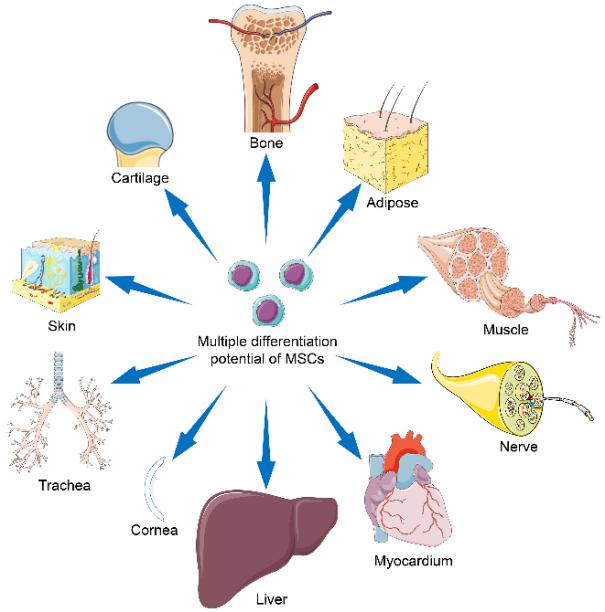All products and services are For Research Use Only and CANNOT be used in the treatment or diagnosis of disease.
As a special cell type, stem cells have self-renewal and multi-directional differentiation potential. They can differentiate into different specialized cell types and perform special functions in the body, including but not limited to blood cells, brain cells, bone cells, and heart muscle cells. It is worth noting that stem cells hold immense potential for advancing medical treatments. Stem cell researches help us gain a deeper understanding of the development of diseases. For translational research, the multidirectional differentiation potential of stem cells can be utilized to further treat some damaging diseases. Furthermore, stem cells can be utilized in the testing of new drugs to assess their safety and efficacy. The multiple applications of stem cells in disease therapy hold great promise for the future.
 Fig.1 Mesenchymal stem cells apply to regenerative medicine.1
Fig.1 Mesenchymal stem cells apply to regenerative medicine.1
Categories of Stem Cells
Applications of Stem Cells
Stem Cells at Creative Biolabs
In order to cater to the demands of our global customers and streamline the conversion of stem cell research into clinical applications, Creative Biolabs enthusiastically offers a diverse range of readily used stem cell products that have undergone rigorous quality assurance measures. Please don't hesitate to contact us and inquire about a suitable product.
Reference
 NEWSLETTER
NEWSLETTER
The latest newsletter to introduce the latest breaking information, our site updates, field and other scientific news, important events, and insights from industry leaders
LEARN MORE NEWSLETTER NEW SOLUTION
NEW SOLUTION
CellRapeutics™ In Vivo Cell Engineering: One-stop in vivo T/B/NK cell and macrophage engineering services covering vectors construction to function verification.
LEARN MORE SOLUTION NOVEL TECHNOLOGY
NOVEL TECHNOLOGY
Silence™ CAR-T Cell: A novel platform to enhance CAR-T cell immunotherapy by combining RNAi technology to suppress genes that may impede CAR functionality.
LEARN MORE NOVEL TECHNOLOGY NEW SOLUTION
NEW SOLUTION
Canine CAR-T Therapy Development: From early target discovery, CAR design and construction, cell culture, and transfection, to in vitro and in vivo function validation.
LEARN MORE SOLUTION